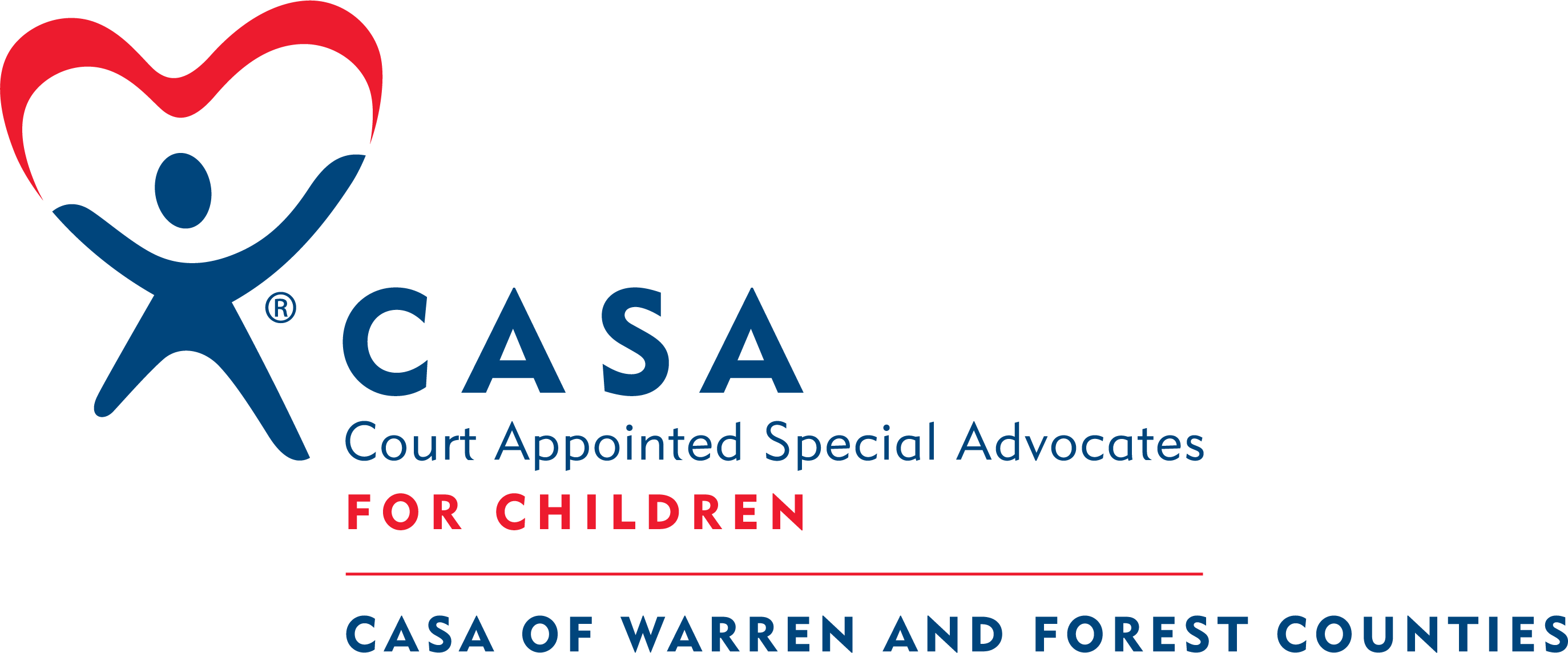Who are Court Appointed Special Advocates?
A Court Appointed Special Advocate (CASA) volunteer is a trained citizen (21 years or older) who is appointed by a judge to represent the best interest of a child in court. The children that CASA volunteers advocate for are before the court as a result of abuse or neglect as defined by the state child welfare laws, living at home or in out-of-home care. CASA best interest advocacy is driven by the guiding principle that children grow and develop best with their family of origin if that can safely be achieved.
Why are CASA volunteers needed?
The answer depends on who you ask.
- Judges value our advocates’ thorough investigative work which sheds light on a child’s circumstance while in the system. CASA volunteers are oftentimes referred to as being an extra set of “eyes and ears” for the courts.
- System Professionals value our advocates’ role on the case because we act as liaisons, bridging service providers together; ensuring everyone is on the same page. CASA volunteers also prove to be an invaluable resource for information about the child and the family.
- A child sees their CASA volunteer as a constant person in their lives who has taken an interest in them. CASA volunteers are cheerleaders in a lot of ways, rooting for the well-being of the child or children in their case, celebrating successes and overcoming obstacles with them.
How does a CASA volunteer differ from a caseworker?
Caseworkers are employed by state and county governments. They work on multiple cases at a time. The CASA volunteer is assigned to only one child or sibling group at a time — an average of 1-2 cases—and therefore, has more time to research each child’s individual needs. The CASA volunteer does not replace a caseworker on a case; they are an independent appointee of the court and can examine a child’s case thoroughly, explore community resources, and make recommendations to the court, independent of agency restrictions. Additionally, the CASA volunteer does NOT provide direct services to the child and parties involved in the case.
How does a CASA volunteer differ from an attorney?
The CASA volunteer does not provide legal representation in the courtroom. That is the role of the attorney or Guardian ad litem (GAL) who provides legal representation for the child. A GAL typically represents many children, whereas a CASA volunteer is assigned to only one child or sibling group at a time. However, the CASA volunteer does provide crucial background information that assists attorneys in presenting their cases.
What training does a CASA volunteer receive?
CASA volunteers undergo a thorough training course conducted by CASA of Warren & Forest Counties staff. The pre-service training is 30 hours and utilizes the National CASA/GAL Association’s training curriculum. CASA volunteers learn about the roles and responsibilities of CASA and how this role fits into the overall system, courtroom procedure and child welfare laws, resilience and trauma, effective communication skills, mental illness, substance abuse, poverty, cultural competence, domestic violence, effective advocacy techniques for children including for educational needs, older youth and LGBTQ youth, court report writing, and are educated about specific topics ranging from child sexual abuse to discussions on childhood development and adolescent behavior. The culmination of the pre-service training is the swearing-in ceremony by the Common Pleas Judge. In addition to the initial training CASA volunteers receive, they are also expected to complete 12 hours of in-service training annually.
How much time does it require to serve as a CASA volunteer?
Each case is different. A CASA volunteer usually spends more time conducting research and interviews prior to the first court appearance. Once the initial investigation is complete, volunteers spend 10-15 hours a month maintaining contacts and gathering information. CASA volunteers visit in-person with the child(ren) they are assigned to at least monthly. Volunteers will also be expected to submit a court report prior to each hearing and be present at each court hearing regarding their case.
CASA volunteers remain committed to their assigned case until it is permanently resolved, i.e., when the child is deemed to be safe and dependency is terminated, which could take anywhere from 18 to 24 months. One of the primary benefits of the CASA program is that, unlike other court principals who often rotate cases, the CASA volunteer is a consistent figure in the proceedings and provides continuity for a child.
I work full time. Can I become a CASA volunteer?
Yes! A lot of the work can be done over the phone, through email, in the evenings and on the weekends.
I can’t commit to becoming a CASA volunteer at this time. Do you have any other options to help?
We are always looking for volunteers to help with events and projects. We have plenty of information on volunteer opportunities here on the CASA website. You may also contact the office at 814-723-4434 to learn about other opportunities.
How do I get started?
Start your journey with CASA of Warren & Forest Counties by telling us more about you.
